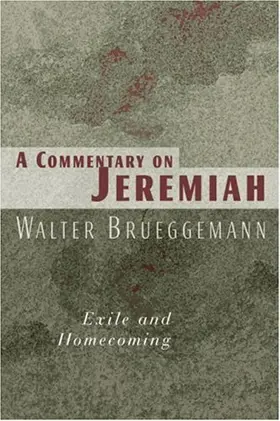

A Commentary on Jeremiah: Exile and Homecoming
Pages
502
Publisher
Eerdmans
Published
1/1/1998
ISBN-13
9780802802804
Reviews
An absolutely brilliant commentary focusing on a sociological and literary reading of the text, capturing the raw, pathos-filled depiction of the experience of Jeremiah and the people of Judah, and the revisioning of God's purposes in history- the tearing down and building up (1:10, 31:28).
A fine theological
commentary on Jeremiah and the God of Jeremiah
Grand Rapids: Eerdmans, 1998. Pp. xvi + 502, Paperback, £19.99/$32.00, ISBN 080280280X. Dale Patrick Drake University Des Moines, IA 50311-4505 This book reprints an International Theological Commentary with a new preface describing the discussion since 1986. Brueggemann welcomes Carroll's advocacy of the issue of "ideology" because ideology is Brueggemann's primary heuristic concept: the book of Jeremiah is a drama of competing ideologies. Israel's covenant with YHWH is the governing ideology: Jeremiah's message of judgment is based on Israel's violation of covenant norms. Juxtaposed to the objective covenant is the pathos of YHWH, expressed both in grief at the death of Israel and yearning for reconciliation. Finally, there is the royal- temple ideology, the primary culprit in Judah's downfall. Tracing everything to exilic editors has upset the consensus that there are three "sources" behind the book--Jeremiah's poetry, Deuteronomistic prose, and Baruch's "biography." Brueggemann agrees that the book is a "construction" of Jeremiah's person and message by Babylonian exiles. To understand the dynamics of the text, he proposes to apply sociological analysis to identify the bearers of textual ideologies and literary analysis to appreciate how discourse creates an imaginative alternative world. Brueggemann believes it is legitimate and salutary to fuse the horizons of textual world and our own. "The text does not need to be applied to our situation" (p. 18). Rather, "(w)hen the text is read and heard as a critique of ideology and as a practice of alternative imagination, the text continues to have power and pertinence in many subsequent contexts, including our own" (p. 17).
[Full Review]


